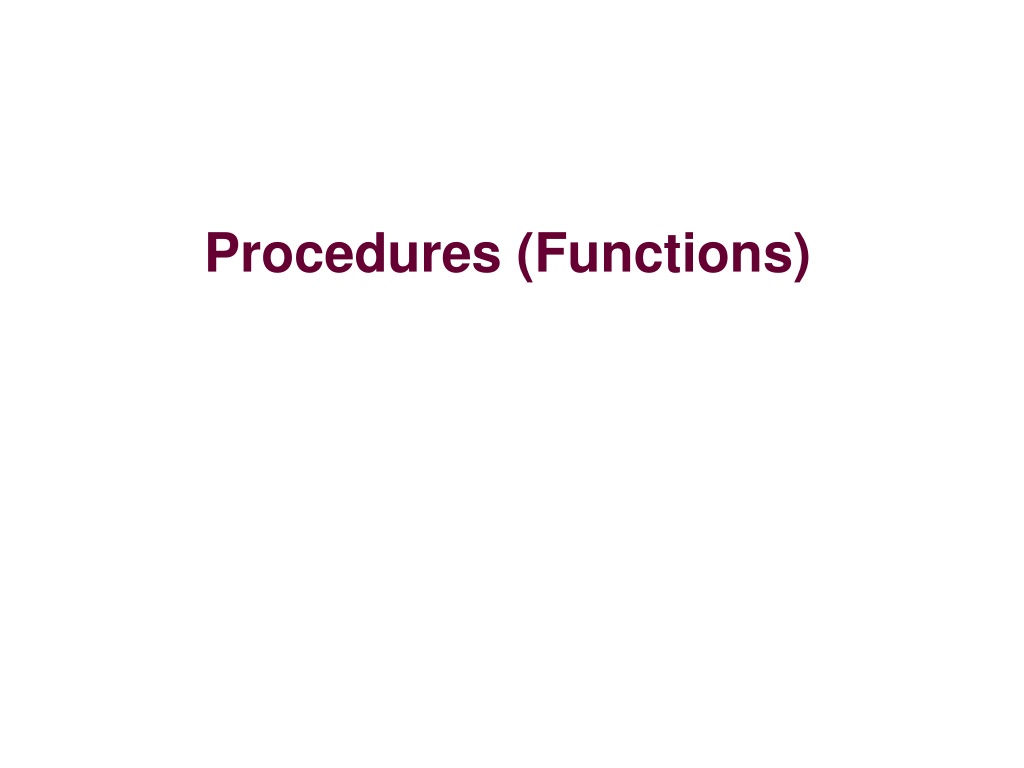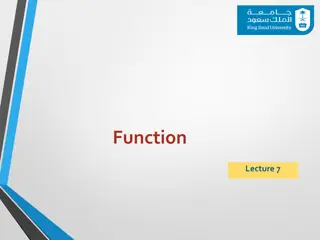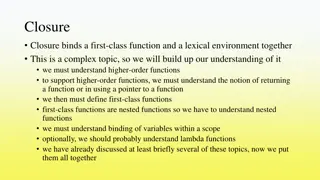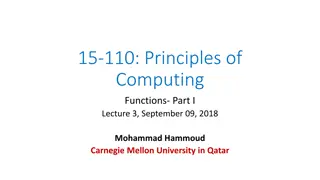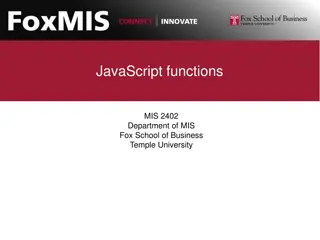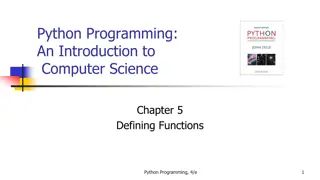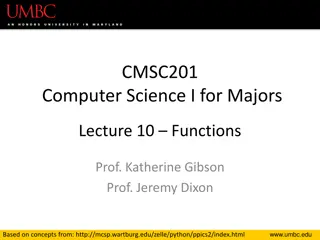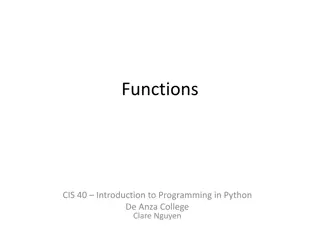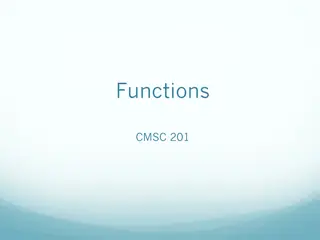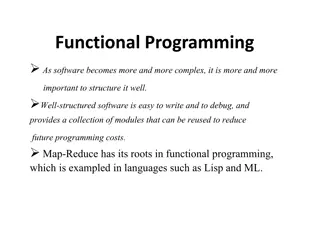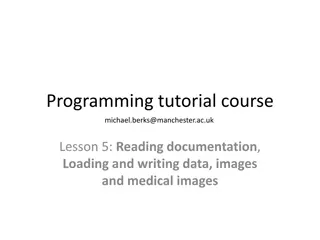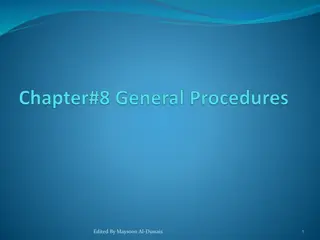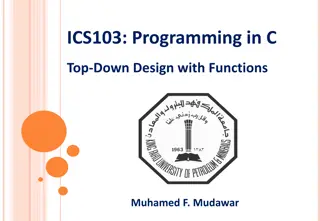Understanding Procedures and Functions in Programming
Explore the fundamentals of procedures and functions in programming, including the control flow changes, function calls, and stack operations. Dive into concepts such as stack management, pushing and popping values, and control flow terminology with practical examples. Enhance your understanding of how functions are invoked, executed, and return control to the caller in a Last-In-First-Out (LIFO) order.
Download Presentation

Please find below an Image/Link to download the presentation.
The content on the website is provided AS IS for your information and personal use only. It may not be sold, licensed, or shared on other websites without obtaining consent from the author. Download presentation by click this link. If you encounter any issues during the download, it is possible that the publisher has removed the file from their server.
E N D
Presentation Transcript
Functions Recall: Two ways to change program control flow Jumps (unconditional, conditional) Calls (functions) Function A unit of code we can call Similar to a jump, except it can return Must support passing data as function arguments and return values Also referred to as a procedure, method, or subroutine Before we continue, we first have to understand how a stack works 2
x86-64 stack Stack Bottom Region of memory managed with last-in, first-out discipline Grows toward lower addresses Register %rsp indicates top element of stack Top element has lowest address Increasing Addresses The stack is essential for function calls Stack Grows Down Stack Pointer %rsp Stack Top 3
Stack Pushing Stack Bottom Pushing pushq Src Fetch operand at Src Decrement %rsp by 8 Write operand at address given by %rsp e.g. pushq %rax subq $8, %rsp movq %rax,(%rsp) Increasing Addresses Stack Grows Down Stack Pointer %rsp -8 Stack Top 4
Stack Popping Stack Bottom Popping popq Dest Read operand at address given by %rsp Write to Dest Increment %rsp by 8 e.g. popq %rax movq (%rsp),%rax addq $8,%rsp Increasing Addresses Stack Grows Down Stack Pointer %rsp +8 Stack Top 5
Stack Operation Examples Initially pushq %rax popq %rdx 0x118 0x118 0x118 0x110 0x110 0x110 0x108 123 0x108 123 0x108 123 0x100 0x100 213 0x100 213 Top Top Top %rax 213 %rax 213 %rax 213 %rdx %rdx %rdx 555 213 555 555 %rsp 0x108 %rsp 0x108 0x100 %rsp 0x100 0x108 6
Control Flow terminology When foo calls who: foo is the caller, who is the callee Control is transferred to the callee When function returns Control is transferred back to the caller Last-called, first-return (LIFO) order naturally implemented via stack foo( ) { call who(); who( ) { } call amI(); amI( ) { } } ret ret 7
Control Flow The hardware provides machine instructions for this: Function call call label Push return address on stack (address of next instruction after the call) Jump to label Function return ret Pop return address from stack Jump to address 8
Control Flow Example #1 0x130 0000000000400540 <multstore>: 400544: callq 400550 <mult2> 400549: mov %rax,(%rbx) 0x128 0x120 %rsp 0x120 %rip 0x400544 0000000000400550 <mult2>: 400550: mov %rdi,%rax 400557: retq 9
Control Flow Example #2 0x130 0000000000400540 <multstore>: 400544: callq 400550 <mult2> 400549: mov %rax,(%rbx) 0x128 0x120 0x118 0x400549 %rsp 0x118 %rip 0x400550 0000000000400550 <mult2>: 400550: mov %rdi,%rax 400557: retq 10
Control Flow Example #3 0x130 0000000000400540 <multstore>: 400544: callq 400550 <mult2> 400549: mov %rax,(%rbx) 0x128 0x120 0x118 0x400549 %rsp 0x118 %rip 0x400557 0000000000400550 <mult2>: 400550: mov %rdi,%rax 400557: retq 11
Control Flow Example #4 0x130 0000000000400540 <multstore>: 400544: callq 400550 <mult2> 400549: mov %rax,(%rbx) 0x128 0x120 %rsp 0x120 %rip 0x400549 0000000000400550 <mult2>: 400550: mov %rdi,%rax 400557: retq 12
Practice problem What does this code do? call next next: popq %rax What is the value of %rax? What would this be useful for? 13
Function calls and stack frames For languages supporting recursion (C, Java), code must be re- entrant Multiple simultaneous instantiations of a single function Must store multiple versions of arguments, local variables, return address Return address Local variables Function arguments (if necessary) Saved register state (if necessary) Stack bottom increasing addresses foo s stack frame who s stack frame stack growth Implemented with stack frames Upon function invocation Stack frame created Stack frame pushed onto stack amI s stack frame Upon function completion Stack frame popped off stack Caller s frame recovered 14 Call chain: foo => who => amI
Call Chain Example Example Call Chain foo( ) { who(); } foo who( ) { amI(); amI(); } who amI amI amI( ) { amI(); } amI amI Procedure amI() is recursive 15
Example Stack foo foo( ) { who(); } %rbp foo foo who %rsp amI amI amI amI 16
Example Stack foo foo( ) { who(); } } who( ) { amI(); amI(); foo foo who %rbp who amI amI %rsp amI amI 17
Example Stack foo foo( ) { who(); } } } who( ) { amI(); amI(); amI(); foo foo amI( ) { who who amI amI %rbp amI amI %rsp amI 18
Example Stack foo foo( ) { who(); } } } who( ) { amI(); amI(); amI(); foo foo amI( ) { who amI( ) { amI(); } who amI amI amI amI %rbp amI amI %rsp 19
Example Stack foo foo( ) { who(); } } } who( ) { amI(); amI(); amI(); foo foo amI( ) { who amI( ) { amI(); } } who amI amI amI( ) { amI(); amI amI amI amI %rbp amI %rsp 20
Example Stack foo foo( ) { who(); } } } who( ) { amI(); amI(); amI(); foo foo amI( ) { who amI( ) { amI(); } who amI amI amI amI %rbp amI amI %rsp 21
Example Stack foo foo( ) { who(); } } } who( ) { amI(); amI(); amI(); foo foo amI( ) { who who amI amI %rbp amI amI %rsp amI 22
Example Stack foo foo( ) { who(); } } who( ) { amI(); amI(); foo foo who %rbp who amI amI %rsp amI amI 23
Example Stack foo foo( ) { who(); } } } who( ) { amI(); amI(); amI(); foo foo amI( ) { who who amI amI %rbp amI amI %rsp amI 24
Example Stack foo foo( ) { who(); } } who( ) { amI(); amI(); foo foo who %rbp who amI amI %rsp amI amI 25
Example Stack foo %rbp foo( ) { who(); } foo foo who %rsp amI amI amI amI 26
x86-64/Linux Stack Frame Caller Stack Frame (Pink) Function arguments for callee Only used with 7+ integer arguments Arguments 1-6 passed in registers Caller Frame Arguments 7+ Return address Pushed by call instruction Return Addr Old %ebp Frame Pointer %rbp (optional) Callee Stack Frame (Yellow) (From Top to Bottom) Old frame pointer (optional) Local variables (optional) If can t keep in registers Saved Registers + Local Variables Callee Frame Saved register context (optional) If certain registers needed Arguments 7+ Stack Pointer %rsp Function arguments for next call 27
x86-64/Linux Stack Frame (aside) Compiler can decide to simplify implementation Can omit local variables and saved registers for simple functions with few variables Can avoid using pushq and popq to manage frame Can even avoid using the call instruction! 28
Function arguments Passed in registers typically Overflow onto stack when needed First 6 integer arguments %rdi %rsi Arg n %rdx %rcx %r8 Arg 8 %r9 Arg 7 Return value %rax 29
swap revisited swap: void swap(long *xp, long *yp) { long t0 = *xp; long t1 = *yp; *xp = t1; *yp = t0; } movq (%rdi), %rdx movq (%rsi), %rax movq %rax, (%rdi) movq %rdx, (%rsi) ret Function arguments all passed in registers First argument (xp) in %rdi, second argument (yp) in %rsi 64-bit pointers No stack operations required (except ret) Can hold all function arguments and local variables in registers Does not call another function so frame allocation not necessary 30
Function arguments beyond 6 call_foo() { long a[16]; foo(a[0],a[1],a[2],a[3],a[4],a[5],a[6],a[7],a[8],a[9]); } Given the above C function, identify function arguments being passed to foo 0000000000000000 <call_foo>: 0: sub $0xA8,%rsp 7: mov 0x68(%rsp),%rax c: mov %rax,0x18(%rsp) 11: mov 0x60(%rsp),%rax 16: mov %rax,0x10(%rsp) 1b: mov 0x58(%rsp),%rax 20: mov %rax,0x8(%rsp) 25: mov 0x50(%rsp),%rax 2a: mov %rax,(%rsp) 2e: mov 0x48(%rsp),%r9 33: mov 0x40(%rsp),%r8 38: mov 0x38(%rsp),%rcx 3d: mov 0x30(%rsp),%rdx 42: mov 0x28(%rsp),%rsi 47: mov 0x20(%rsp),%rdi 4c: callq <foo> 51: add $0xA8,%rsp 58: retq a[9] a[8] a[7] a[6] a[5] a[4] a[3] a[2] a[1] a[0] 31
Local variables Held in registers if possible Allocate space on stack if too many (register spilling) Compiler allocates space on stack and updates %rsp How are they preserved if the current function calls another function? Compiler updates %rsp beyond local variables before issuing call What happens to them when the current function returns? Are lost (i.e. no longer valid) 32
Local variables call_foo() { long a[16]; foo(a[0],a[1],a[2],a[3],a[4],a[5],a[6],a[7],a[8],a[9]); } 0000000000000000 <call_foo>: 0: sub $0xA8,%rsp 7: mov 0x68(%rsp),%rax c: mov %rax,0x18(%rsp) 11: mov 0x60(%rsp),%rax 16: mov %rax,0x10(%rsp) 1b: mov 0x58(%rsp),%rax 20: mov %rax,0x8(%rsp) 25: mov 0x50(%rsp),%rax 2a: mov %rax,(%rsp) 2e: mov 0x48(%rsp),%r9 33: mov 0x40(%rsp),%r8 38: mov 0x38(%rsp),%rcx 3d: mov 0x30(%rsp),%rdx 42: mov 0x28(%rsp),%rsi 47: mov 0x20(%rsp),%rdi 4c: callq <foo> 51: add $0xA8,%rsp 58: retq Makes room for both a[16] and partial argument build for foo. 33
Scoping issues with local variables Consider int* func(int x) { int n; int *np; n = x; np = &n; return np; } What does np point to after function returns? What happens if np is dereferenced? Local variables are lost when function returns Address referred to is no longer part of the stack Can be overwritten by other function calls Dereference will return whatever is at location (can be arbitrary) http://thefengs.com/wuchang/courses/cs201/class/08/invalid_ref.c 34
Putting it all together: incr long incr(long *p, long val) { long x = *p; long y = x + val; *p = y; return x; } incr: movq (%rdi), %rax addq %rax, %rsi movq %rsi, (%rdi) ret Register %rdi Use(s) Argument p %rsi Argument val, y %rax x, Return value 35
Example: Calling incr #1 Initial Stack Structure long call_incr() { long v1 = 15213; long v2 = incr(&v1, 3000); return v1+v2; } . . . Rtn address %rsp call_incr: subq $16, %rsp movq $15213, 8(%rsp) movl $3000, %esi leaq 8(%rsp), %rdi call incr addq 8(%rsp), %rax addq $16, %rsp ret Resulting Stack Structure . . . Rtn address %rsp+8 15213 %rsp Unused 36
Example: Calling incr #2 Stack Structure long call_incr() { long v1 = 15213; long v2 = incr(&v1, 3000); return v1+v2; } . . . Rtn address %rsp+8 15213 %rsp Unused call_incr: subq $16, %rsp movq $15213, 8(%rsp) movl $3000, %esi leaq 8(%rsp), %rdi call incr addq 8(%rsp), %rax addq $16, %rsp ret Register %rdi Use(s) &v1 %rsi 3000 37
Example: Calling incr #3 Stack Structure long call_incr() { long v1 = 15213; long v2 = incr(&v1, 3000); return v1+v2; } . . . Rtn address %rsp+8 18213 %rsp Unused call_incr: subq $16, %rsp movq $15213, 8(%rsp) movl $3000, %esi leaq 8(%rsp), %rdi call incr addq 8(%rsp), %rax addq $16, %rsp ret Register %rdi Use(s) &v1 %rsi 3000 38
Example: Calling incr #4 Stack Structure long call_incr() { long v1 = 15213; long v2 = incr(&v1, 3000); return v1+v2; } . . . Rtn address %rsp+8 18213 %rsp Unused call_incr: subq $16, %rsp movq $15213, 8(%rsp) movl $3000, %esi leaq 8(%rsp), %rdi call incr addq 8(%rsp), %rax addq $16, %rsp ret Register %rax Use(s) Return value Updated Stack Structure . . . %rsp Rtn address 39
Example: Calling incr #5 Updated Stack Structure long call_incr() { long v1 = 15213; long v2 = incr(&v1, 3000); return v1+v2; } . . . %rsp Rtn address call_incr: subq $16, %rsp movq $15213, 8(%rsp) movl $3000, %esi leaq 8(%rsp), %rdi call incr addq 8(%rsp), %rax addq $16, %rsp ret Register %rax Use(s) Return value Final Stack Structure . . . %rsp 40
Register Saving Conventions When foo calls who: foo is the caller, who is the callee Can Register be Used for Temporary Storage? Need some coordination between caller and callee on register usage Conventions Caller Save Caller saves temporary in its frame before calling Callee Save Callee saves temporary in its frame before using Callee restores values before returning 41
x86-64 caller-saved registers Can be modified by function %rax Return value %rdi,%rsi,%rdx %rcx,%r8, %r9 Function arguments %r10, %r11 %rax %rdi %rsi Return value %rdx %rcx %r8 %r9 %r10 %r11 Arguments Caller-saved temporaries 42
x86-64 callee-saved registers %rbx %r12 %r13 %r14 Callee must save & restore %rbx,%r12,%r13,%r14 %rbp May be used as frame pointer %rsp Special form of callee save Restored to original value upon return from function Callee-saved Temporaries %rbp Special %rsp 43
x86-64 Integer Registers %rax %r8 Return value Argument #5 %rbx %r9 Callee saved Argument #6 %rcx %r10 Callee saved Argument #4 %rdx %r11 Used for linking Argument #3 %rsi %r12 C: Callee saved Argument #2 %rdi %r13 Argument #1 Callee saved %rsp %r14 Stack pointer Callee saved %rbp %r15 Callee saved Callee saved 44
Callee-Saved Example #1 Initial Stack Structure long call_incr2(long x) { long v1 = 15213; long v2 = incr(&v1, 3000); return x+v2; } . . . Rtn address %rsp call_incr2: pushq %rbx subq $16, %rsp movq %rdi, %rbx movq $15213, 8(%rsp) movl $3000, %esi leaq 8(%rsp), %rdi call incr addq %rbx, %rax addq $16, %rsp popq %rbx ret Resulting Stack Structure . . . Rtn address Saved %rbx %rsp+8 15213 %rsp Unused 45
Callee-Saved Example #2 Resulting Stack Structure long call_incr2(long x) { long v1 = 15213; long v2 = incr(&v1, 3000); return x+v2; } . . . Rtn address Saved %rbx %rsp+8 15213 call_incr2: pushq %rbx subq $16, %rsp movq %rdi, %rbx movq $15213, 8(%rsp) movl $3000, %esi leaq 8(%rsp), %rdi call incr addq %rbx, %rax addq $16, %rsp popq %rbx ret %rsp Unused Pre-return Stack Structure . . . Rtn address %rsp 46
Floating point arguments Recall integer arguments 64-bit registers used to pass %rdi, %rsi, %rdx, %rcx, %r8, %r9 Floating point Special vectored registers to pass (AVX-512) %zmm0 - %zmm31 Capacity for a vector of 8 doubles Also used for vectored integer operations (more later) 511 255 127 0 %zmm0 %ymm0 %xmm0 47
Optimizations: Explain the jump When swap executes ret, it will return from swap_ele Possible since swap is a tail call (no instructions afterwards) long scount = 0; /* Swap a[i] & a[i+1] */ void swap_ele(long a[], int i) { swap(&a[i], &a[i+1]); } swap_ele: movslq %esi,%rsi # Integer promotion leaq (%rdi,%rsi,8), %rdi # &a[i] leaq 8(%rdi), %rsi # &a[i+1] jmp swap # swap() 48
32-bit calling conventions Linux IA32 cdecl Caller pushes arguments on stack before call Caller clears arguments off stack after call Win32 stdcall Caller pushes arguments on stack before call Callee clears arguments off stack before returning from call Saves some instructions since callee is already restoring the stack at the end of the function fastcall Save memory operations by passing arguments in registers Microsoft implementation First two arguments passed in registers %ecx and %edx Code written on Windows must deal with stdcall and fastcall conventions Linux Must declare in function prototype which calling convention is being used http://gcc.gnu.org/onlinedocs/gcc/Function-Attributes.html 49
32-bit calling conventions thiscall Used for C++ Linux Same as cdecl, but first argument assumed to be this pointer Windows/Visual C++ this pointer passed in %ecx Callee cleans the stack when arguments are not variable length Caller cleans the stack when arguments are variable length 50
